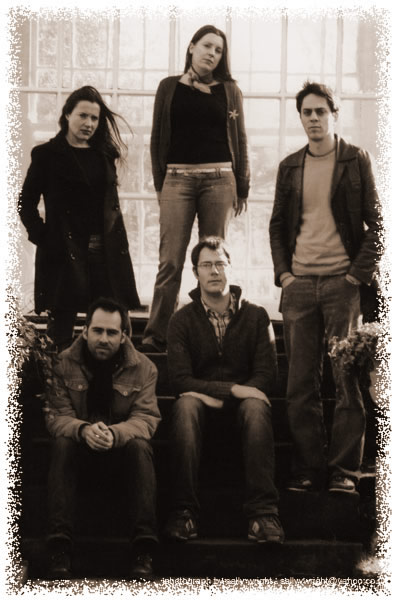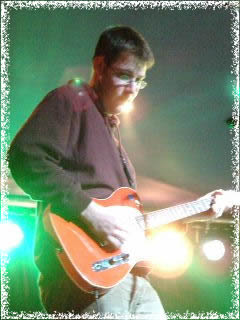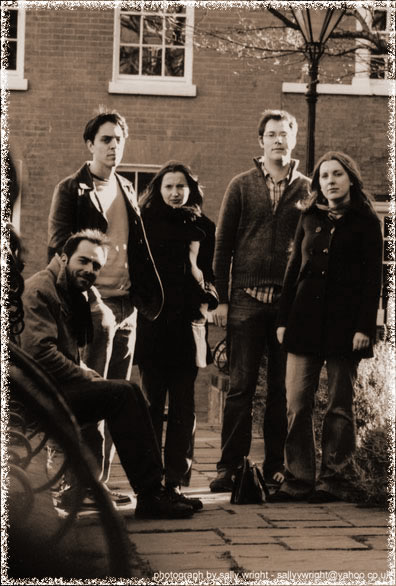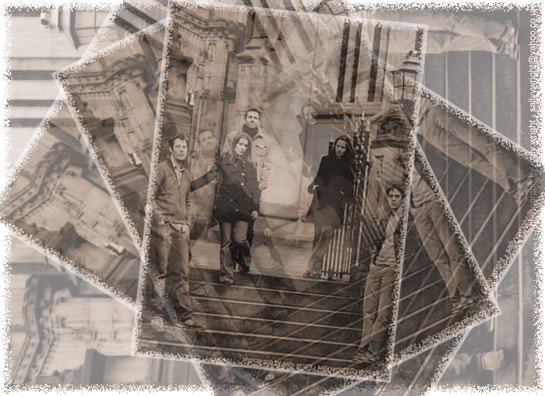


From the moment ‘Klaus Kinski’s opening chime and ticking pocket watch slowly yield to Krisztina Hidasi’s mourning violin strolling through the room, this international quintet (named after George Bernard Shaw’s play and whose members hail from as far as Strasbourg, France and Mohacs, Hungary to the southern Nottinghamshire neighbourhood of West Bridgford) offer a haunting, stalking ballad which casts Werner Herzog’s favorite whipping post as Death in Ingmar Bergman’s ‘Seventh Seal.’ If you’ve ever seen Nastassja’s dad as Nosferatu, you’ll recognize the perfect fit, but lyrics such as “I can see the shadows/Play around your eyes” and “Come and we’ll play/A game of chess/Whoever loses dies” should erase any lingering doubts. The suicidal imagery of ‘Tigermoth’ (“I cannot see the sky/From the bottom of the sea…My heart will beat no more”) is delivered with Ellen Mary McGee’s impassioned wail that’ll have you tasting her salty tears in your own saliva as you swallow that lump in your throat, and Krisztina’s dirgey violin accompaniment adds another layer of grieving warmth.
I guarantee you haven’t heard the likes of the funereal death march that is ‘Electric Light, Shine On’ since Joy Division’s ‘Decades.’ Guitarist Matthew Williams’ duet with Krisztina opens ‘The Ways That We Shall Go On,’ which is a swaying, bittersweet serenade with a melody worthy of Leonard Cohen or Green Pajamas’ front man, Jeff Kelly’s solo homages to same that’ll send entwined lover’s either waltzing into the night or over the nearest cliff. ‘For Star City’ wraps the all-too-short mini album up in McGee’s treacley sweet vocals for another twisted, romantic novella that’d sit comfortably on a Sharron Kraus, Fairport Convention or Nottingham neighbours, Tindersticks album. Exquisite… emotional… essential.
Jeff Penczak interviewed St Joan exclusively for Terrascope Online in August 2005, with a few supplementary questions thrown in by Phil McMullen.
Key: EM= Ellen McGee / MH= Matt Harms / KH= Krisztina Hidasi / CD= Christophe Dejous
PT: I have to admit one of the first things that attracted me to you guys before I even heard ‘December’ on the cover CD to Ptolemaic Terrascope issue 32 (October, 2002) was that wonderful name. My Catholic upbringing led me to research Joan of Arc to the point of selecting her as my adopted patron saint nearly 30 years ago. Are you as fascinated with her as I am and what led to selecting her for your group name?
EM: I am pretty interested in Joan of Arc I suppose although I suspect you are the more eminent authority on the subject! Our reasons for choosing the name have more to do with the fact that I had just read the George Bernard Shaw play Saint Joan. Not a fascinating story…
Is there a religious side to the band that may not be readily apparent through your music or lyrics?
EM: I’m certainly not a religious person myself, although family members are. I didn’t have a religious upbringing, apart from attending the odd Sunday school class and occasionally Midnight Mass. I don’t think any of us are really. I think every religion can be misconstrued and misinterpreted and I just stay neutral! I’m a bit middle-of-the road like that!
Your educational background precedes you via references to George Bernard Shaw, James Joyce’s ‘Chamber Music’, and Virginia Woolf. I even had the pleasure of listening to your improvised musical backing to T.S. Eliot’s ‘The Wasteland’ that you performed live during an interview/in-studio performance that I organized for you at a college station in New Jersey when you visited the States last April. It almost seems like you could be college professors if you didn’t choose to pursue music?
EM: Well, I think over the next few years I will do a masters degree and maybe move into teaching or something but for the time being, although I do work a full time job, I’m glad I can leave that behind and concentrate on music after work rather than worrying about researching dissertations and exams. I think I need a break from that for a while!
MH: If I wasn’t in this band then I would be a chef (yep I’m just like Jamie Oliver). I still intend to pursue a culinary career at a later date.
KH: I actually dabbled with teaching whilst in Sweden and on my arrival to the UK. I have always believed in education so teaching seemed like a natural thing to do at the time.
I’m also intrigued by what I perceived as several cinematic references in the lyrics on your debut mini album ‘One At Twilight,” particularly ‘Nosferatu’ and ‘Seventh Seal’ on the opening track, ‘Klaus Kinski.’ Are these references to other media (eg., cinema, literature) components of your music that would like to explore further?
EM: I suppose we do have quite a few film references in our music and I would say we are influenced by the several other art forms. I think I was watching a lot of Herzog and Bergman while writing the lyrics to the songs on One At Twilight, which may contribute to the ominous undercurrents which have been picked up on in some of our reviews. I think it would be great to do a film soundtrack at some point… We’re supposed to be doing some music for a documentary on schizophrenia through my work (I work for a mental health charity as my day job) which will be interesting but it would be fun to do a feature film.

Please tell us the fascinating story of how the band got together? Not many projects boast members from three different countries who speak different languages. Did you meet at school?
EM: It was a gradual thing. I started playing guitar and writing songs at the age of about 16 and started playing at folk nights in Nottingham at 17/18. I decided to try and form a band about a year later, initially called Solar Plexus (until we discovered a band of the same name and also grew to dislike it). In about 1999/2000 Saint Joan evolved from that with a few people coming and going until it settled as the current line up in about 2003. We didn’t do much until I left university though, as I was quite busy studying and working to pay my way through. We put out a 7” though.
Ellen McGee
MH: I joined the band about three and a half years ago. When I joined we were just about to release ‘The Ice House’/’All Things Melt’ and still had our flute player. About a year later our flautist left and I was living with Matt Williams, who I’ve known since secondary school, so I invited him along to a few practices which lead on to him becoming our lead guitarist.
KH: I went to school in Hungary and France but I met Christophe in England. Shortly afterwards he decided to join a band and that’s how I first got introduced to Ellen, and later on to Matt drums and Matt guitar.
EM: I met Krisztina and Christophe about six years ago. They had both been living in the UK for a few years having hot-footed it over from France (Krisztina having come via Hungary, Sweden and a few stops in between) My story is less exotic I’m afraid - I’ve lived in Nottingham all my life! Although I’ve progressed from leafy suburbia to an inner city slum. It’s good for inspiration though, apparently.
You might have answered this in the above question, but if not: you mention that there have been several musicians that passed through your ranks before you arrived at the current line-up. In fact, your debut single had different personnel. What were the important ingredients you were looking for when you assembled the band?
EM: Just people who could relate to the songs I was writing, played sympathetically on them i.e quite sparsely. We are also all good friends too, which helps. This wasn’t necessarily the case before and it is only in the last couple of years that we have been practicing for a good three nights a week and really thinking about what we are doing.
Some of your songs, such as ‘Klaus Kinski,’ ‘Tigermoth,’ and ‘Electric Light, Shine On’ have very morose, even morbid atmospheres that often reminded me of bands like Joy Division. An important element to creating that emotion is Krisztina’s atmospheric violin playing and Christophe’s heavy basslines. Do you think your backgrounds lend a European vibe to the music or would Saint Joan’s sound be the same even if everyone were from Nottingham? I guess I’m trying to ask if Saint Joan’s sound could be considered more “European” than, say, British?
MH: I think it has more to do with our eclectic musical tastes and who we are as people than where we are from.
KH: I consider myself as being European more than anything else, but I also agree with Matt.
While bands like Tindersticks and Six by Seven (and their offshoot, Twelve) have impressed over here in the States, you have championed other artists like Seachange, The Lords and Chemistry Experiment that we should look out for that aren’t as well publicised. Can you tell us more about your local scene in Nottingham?
EM: There are some brilliant but often overlooked bands in Nottingham. Seachange signed to Matador Records and put an album out on that label, The Chemistry Experiment are doing something really interesting, kind of fusing early Pulp with a bit of prog and disco - I did backing vocals on their new album actually. The Nordic Mile are worth checking out (although I’m biased - I play drums in the band!). Our singer is off to study for a Masters in Medieval Literature in London though so we’re going to be quiet for a while. We don’t have many good venues in Nottingham. I have put musicians on in my house (Rivulets, Annalies Monsere, The Diskettes…) and we have an old school hall nearby which people sometimes use for shows, but that’s about it.
 You’ve
worked with a few labels via compilations (Fire, Slow Noir) and Dakota
released your debut single and album. Their website links back to yours – is
Dakota your own imprint?
You’ve
worked with a few labels via compilations (Fire, Slow Noir) and Dakota
released your debut single and album. Their website links back to yours – is
Dakota your own imprint?
EM: Yeah, both of our releases have been on our own label, Dakota. It’s been hard to get European distribution without the kudos of a known label but we’ve managed ok in the UK and USA.
Tell us about your relationship with Fire and Slow Noir – did you submit your songs to them or did they approach you?
EM: I rented a room for a short while from the guy who runs Fire Records so that’s how I met him. The Slow Noir thing developed from our links with the Penny Black Music website. They always championed our music and arranged gigs for us in London. Someone from the website started the Slow Noir record label and asked us to contribute a song- which we did!
Matt Harms
Do you find it is difficult for young bands just starting their careers to get noticed by labels who are looking to add new talent to their rosters? Is it still very difficult to get signed by a label with decent distribution opportunities to get your music out into the world?
CD: Yes, and it’s getting more and more difficult every day for bands to get noticed unless you’re extremely good looking and your latest video involves you doing an outdoor striptease in the middle of nowhere (and it’s bloody freezing) while singing the line “you’re beautiful” at least 40 times while gazing at the camera and foolishly concluding this by jumping off a 50ft cliff. I am probably jealous, mind you the Magic Numbers are doing well…
KH: And it’s a good job he got noticed too! Do you not feel extra special when he looks at you through the camera and seems to be singing just for you?
EM: Although being on a decent label with good distribution would be ideal, it’s just not that easy. We are not afraid of a little bit of hard work and over the past few years getting our music to people like Phil from Ptolemaic Terrascope and George at Dream magazine as well as being able to tour without the support of a label suggests that it is possible to do things without a label, it just means reaching the right people. It’s nice to make good friends in the process of making music, organizing press and arranging tours. Since we do all of that on our own as a band, we have the benefit of being on the front line. It doesn’t seem like work then. It would be nice to have help from a label in organizing tours and distribution though as it’s harder to deal with people who are less sympathetic to your music and it takes a lot of time and effort to find people who are.
I think there is enough support for bands like those across the ‘Terrascopic’ spectrum, tapping into folk and psychedelia, and getting little in the way of mainstream support, to provide bands with sufficient platforms to release music and tour. Obviously some bands who have been supported by magazines like Ptolemaic Terrascope and Dream are now reaching wider audiences. People like Six Organs of Admittance, Espers and various Charalambides-related projects.
You’ve played locally at The Rescue Rooms, down in London and over in Bristol and had a successful mini-tour of the northeastern US. Have you had a chance to hit the continent yet?
MH: Unfortunately not. There have been numerous discussions about a European tour and our album seems to have been well received in Italy and Spain, but we have no concrete plans to play in Europe at the moment. Maybe next year?
KH: All these languages might come in use then since in the band we only tend to speak two: English and Pidgin English.
In general, do all your audiences seem receptive to the music you are offering or do you play in front of a lot of folks who just seem out to get drunk and have a good time, regardless of the band onstage?
MH: In general I think people like what we do. We haven’t been booed off stage. Yet! Because our music is pretty quiet people do have a tendency to talk over it, especially when the alcohol is flowing freely, but we got used to that a long time ago. If people want to listen, they do and it’s great when you have the undivided attention of the audience.
EM: People aren’t necessarily always into what we do. However as with most things it depends on the context. We did a short tour with Quasi and that wasn’t really the best platform for us. I think it works better when a bill is more consistent, whilst still being varied. Playing with people like Sharron Kraus, Black Forest/ Black Sea, Victory At Sea, Pram, The Telescopes and Seachange- band’s whilst not really playing the same kind of music as Saint Joan, have similar threads, aesthetics, idioms. Perhaps music which has an overt or covert melancholy and an experimental heart (although we are probably the least experimental out of that bunch!).
Ellen, you kindly worked as a volunteer at the Terrastock festival over in Boston in 2002 – having experienced it, and been invited to perform next time, you’re presumably looking forward to Terrastock 6 next April?
EM: Working at Terrastock 5 was a watershed in terms of seeing in action how an entire, I suppose, scene, can pull together to create something great. It was the first time I had seen (and in some cases heard) bands like Landing, Charalambides, Hopewell, The Iditarod, Paik and Greg Weeks. It was also amazing to see the likes of Tom Rapp, Sonic Youth, Damon and Naomi, Ghost and Acid Mothers Temple, all of whom I was already a big fan of. Seeing songs from Pearls Before Swines ‘One Nation Underground’ brought to life was something I never thought I would see and was truly magical. Festivals like Terrastock- It’s a very symbiotic thing and I don’t think there is really support for that kind of thing in the UK which is sad. We are very excited about playing the next one in 2006 and although we don’t know who else is playing yet, I have a few bands on my wishlist who I really hope are playing- both in terms of sharing a festival with them and seeing American bands who don’t come to the UK very often… I look forward to the final line up!
Krisztina, tell us about your home in Mohacs. Do you still live there or have you relocated to be closer to the band. What’s the Hungarian music scene like where you came from (if you know)?
KH: Hmm…, it’s difficult to tell; I’ve never been involved in music making when I lived there. To tell the truth, my hometown looks more like a village, and nothing much happens there as far as I know. The most popular local pastimes are swimming, fishing and eating fish! The famous “halászlé” (lit. Fisherman’s soup) is unbeatable. If you’re not into water activities you will need to get out and drive a few miles before reaching Pécs, a reasonably sized town. But I suspect that Budapest is really where things tend to get moving, so most musicians either relocate to the capital or emigrate. Hungarians are a nomadic population. Somebody once commented that Hungarians would sing about how sad they felt because of the way the system was treating them, and yet once they left home for a better future, they couldn’t help but cry over their beloved country.
I discovered Akosh S Unit in France when I was a student. I think he’s based in Paris. He’s well connected to Bertrand Cantat (lead singer in the well-established indie band “Noir Désir”), which probably was the best publicity he could get. Four or five years ago I heard of Yonderboi (a mixture of jazz and hip-hop with an Eastern European flavour) through a Dutch acquaintance. I think he still lives in Hungary.

Can you each tell us what music you listen to in your spare time and if that finds its way into your songs?
MH: I listen to a wide range of music including: The Velvet Underground, Jonathan Richman, Lee Hazelwood, A Tribe Called Quest, Capital K, The Smiths, The Pixies, Public Enemy. I really like drumming that sounds simple on first listen but when you really listen it has a real technical edge to it and I try to keep this in mind when writing the drum parts for saint joan songs.
KH: Ironically I haven’t been listening to much music since I began to learn the violin.
EM: Recently I’ve been listening to Comus, Ann Briggs, Sandy Denny, Kemialliset Ystavat, Marissa Nadler, that kinda thing - also Neutral Milk Hotel and some other older stuff like The Free Design.
What are your guilty pleasures? I’m sure there’s a closet ABBA fan in your midst?
CD: ‘The Antiques Roadshow’ each Sunday night on BBC1.
KH: Did I not catch you reading your horoscope the other day, Christophe?
Do you enjoy reading comparisons with other artists or does that pigeonhole your music too much? I’ve read everyone from PJ Harvey, Cowboy Junkies and Mazzy Star to Radiohead, Flying Burrito Brothers and Opal namechecked in your reviews, with our own Mats Gustafsson finding link to other Terrascope favorites, Broken Dog and Piano Magic. In fact, you’ve toured with a Broken Dog offshoot, Pram. Are these fair assessments and who would you admit to having influenced your songwriting and ultimate sound?
EM: I was definitely influenced by Mazzy Star and PJ Harvey when starting out but in my late teens/ early twenties I got into Folk music in a big way so became more in tune with the likes of Pentangle, Ann Briggs, Vashti Bunyan, etc.
If memory serves, some of you recently finished school or are about to finish your studies? May I ask what subject area you’ve been concentrating on (we call them “majors” here in the US) and how that will impact your music?
EM: I did a degree in English Literature and History, which I suppose ties in musically in terms of telling stories (although my songwriting is becoming a lot less narrative these days) and in a traditional sense of keeping themes alive through art.
KH: My Masters Degree doesn’t exactly lead to a profession with a title, like “Doctor”, “Engineer”, “Architect” etc. I studied various subjects such as law, finance, accountancy, marketing etc., the whole sprinkled with foreign languages. I didn’t choose those subjects out of personal preference but rather because, not having a clue about what career would suit me, I figured they would give me a better understanding of the “real” world. I had to be practical, you see. Big mistake! But I don’t regret it. Oh, special mention to the career advisor that was assigned to me at school, who kept talking about his passion for marine biology! From this respect, I don’t think my studies reflect my personality, and can’t see any link with Saint Joan’s music.
Do you all feel that you would like to continue to pursue careers in music, or are you just having fun doing something you love until that lucrative job offer comes along forcing you to chuck all this fame and fortune for a family and a mortgage?
EM: I have a relatively responsible job at the moment (working for a mental health charity as I mentioned earlier) and hope to always be able to pursue music as well as working. I only wish I had more holidays in order to tour. At the moment I get six weeks but others in the band only get three or four which is why we can’t do much touring. The arts funding system in this country is a joke so our only option is to play music in the evenings and tour very rarely in order to hold our jobs down.
MH: I am really enjoying Saint Joan at the moment. It’s great to see the band continually evolving and our song writing is getting better and better. I don’t know about a lucrative job but I do want to be a chef, as food is my other great passion.

What can we look forward to next from Saint Joan? And please don’t tell me Ellen’s solo album! Tours… another full length?
EM: We are recording an album in September which we are going to foist upon various eminent independent labels with a view to them putting out an album for us. That’s the plan anyway! Although we may put it out ourselves. Then we will be hitting the States in April next year!
© terrascope.online, September 2005. With gracious thanks to Ellen for all her help and support down the years, and to Jeff Penczak for sorting out this long overdue interview.
(Dakota Records, 126 Sneinton Dale, Sneinton, Nottingham NG2 4HG, England)